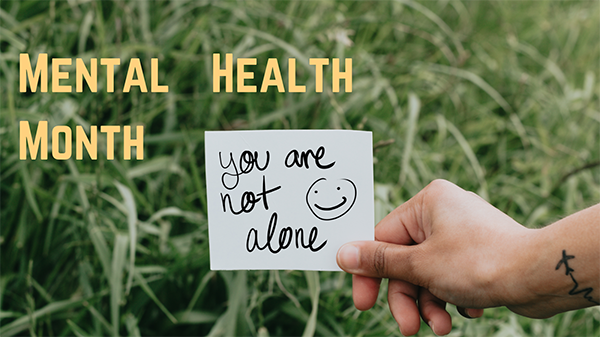Guest Post: Speaking in the Struggle

May is Mental Health Month.
I was born 10 weeks early, with cerebral palsy. When I was six months old, my doctor prescribed pool therapy for me because I hadn’t hit some developmental milestones. I did pool therapy from the time I was six months old to when I finished high school, as well as land therapy for much of that time. I do not know what my life would be like today without these therapies. Over the years, physical therapists have strengthened me and helped me know how to move my body as much as I can.
Just as such interventions were helpful to me physically, my mental health is also important. Mental health influences how we make decisions, build relationships and shape the world we live in. It is good to seek treatment for mental health issues like depression and anxiety, just as you would for physical illnesses like cancer and diabetes. We all have bad days and sad times, but depression is more than sadness. Anxiety is more than nervousness. If you find that your mental health is interfering with your day-to-day life significantly, seek professional help. If you find mental health professionals that are the right fit for you, they can become an invaluable part of your support system. If, with professional guidance, taking medication becomes part of maintaining your mental health, that is just as valid as taking medication for a physical ailment.
Finding the best mental health professionals for you may not be easy. In evaluating whether a mental health professional is a good fit for you, there are many factors to consider beyond their expertise. Do they communicate well with you? Can they explain complex topics in a way you understand? Do they strive to care about you as an individual and not only as another client on their caseload? If certain values are most important to you, do they share or at least respect those values?
The factors in the previous paragraph are largely the intangibles. However, there are practical factors like their physical location and your ability to get to appointments. This can be particularly stressful if you have a disability that affects your ability to drive and/or travel. In the last few years, however, the ability to do telehealth appointments and virtual therapy sessions has removed this barrier. Now you can have a therapy session in your own home if you so choose.
I do not have a diagnosed mental health issue, but I've found that one of the most helpful ways to deal with stress is to talk about my thoughts and feelings. Many disabilities impact a person’s ability to communicate, however. Helen Keller, who became deaf and blind at 18 months old and lost the ability to truly communicate until she was nearly seven years old, used the analogy of being at sea in a dense fog, a ship without a compass. (The Story of My Life, 1903, Chapter 4). If a person’s disability in any way affects their ability to communicate, they may feel this frustration.
If someone’s disability affects their communication skills significantly, finding the right mental health professional may take more time and effort. Learning to communicate effectively with someone new is a process. One tip I can give is to never be too embarrassed to ask questions when you don’t understand something. It often helps to repeat back to the person what you think they said. It may help you remember it better, and it gives them an opportunity to rephrase as needed. Nobody can read your mind, so speak up when you are confused. If they aren’t willing to explain things to you on your level, they are not the right fit for you. When you understand what someone is asking you to do and you know they care, you often feel empowered to keep going on the journey, even when it’s rough. Effective communication involves more than saying words; it involves interacting in ways that are understood and appreciated by both communicators.
Helen Keller was frustrated when she was unable to communicate very well. But once she learned the tools she needed to communicate, she had a lot to say, and went on to write several books and articles and give speeches. The first word she learned was water. She wrote, “That living word awakened my soul, gave it light, hope, joy, set it free!” Helen discovered that “everything had a name, and each name gave birth to a new thought [and] every object which I touched seemed to quiver with life. That was because I saw everything with the strange, new sight that had come to me.” (The Story of My Life, 1903, Chapter 4).
Mental health professionals can provide you with tools for success. As you name your struggles and work to understand them, I hope it will set you free. This Mental Health Awareness Month and always, let’s speak about our struggles, name them, and then go on living. We don’t need to do it by ourselves, and often we can’t. So often, it turns out, we need each other.

